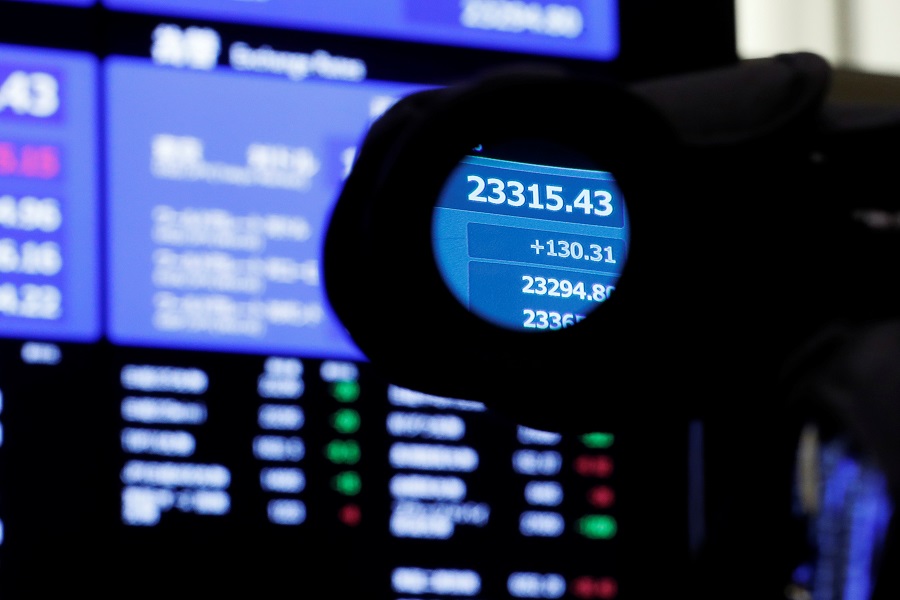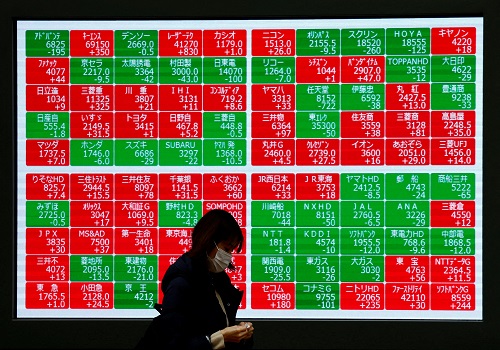Asia shares see pockets of gains, China PMI tops forecasts

Asian share markets got off to a quiet start on Monday as investors braced for a data-packed week culminating in a U.S. jobs report that could decide whether a rate cut expected this month will be regular or super-sized.
A holiday in the United States and Canada made for thin liquidity, while wins for far-right parties in German state elections added a fresh layer of political uncertainty.
The dollar was hanging on to gains made on Friday after upbeat spending figures led markets to trim the chance of a half-point easing from the Federal Reserve.
Futures are 100% priced for a cut of 25 basis points on Sept. 18, and imply a 33% probability of 50 basis points. They also have 100 basis points of cuts priced in by December, and 120 basis points for 2025.
The Bank of Canada is expected to cut again on Wednesday, with markets implying a 22% chance of 50 basis points.
Crucial for the Fed will be the payrolls report on Friday where analysts look for a rise of 165,000 in jobs and a dip in the unemployment rate to 4.2%.
"The risks going into this crucial release seem highly asymmetric as a solid report is very unlikely to derail the September cut," said Barclays economist Christian Keller.
"In contrast, a weak report would likely validate the popular narrative that the U.S. economy and labour market are on the precipice, necessitating a fast and deep cutting cycle, leading to another sharp repricing."
Fed Governor Christopher Waller and NY Fed President John Williams happen to be speaking after the job data, giving the market a near-instant reaction.
Also important this week will be the ISM surveys, JOLTS job openings and ADP employment, trade and the Fed's Beige Book.
Those risks kept investors cautious with S&P 500 futures and Nasdaq futures little changed.
DOLLAR FINDS SUPPORT
EUROSTOXX 50 futures were flat, while FTSE futures added 0.3%.
Asian markets mostly followed Friday's rally on Wall Street, with Japan's Nikkei up 0.5% and adding to last week's 8.7% bounce. [.N]
MSCI's broadest index of Asia-Pacific shares outside Japan barely moved, while South Korean stocks edged up 0.1%.
Chinese blue chips dipped 0.6%, led by losses in real estate after a survey showed home prices growth had slowed.
The Caixin survey of manufacturing showed a pick up to 50.4 in August, topping forecasts of 50.0. Surveys on Japan and South Korea factories both showed an improvement in activity.
Cash Treasuries were untraded for the holidays, while Treasury futures were little moved. Ten-year yields stood at 3.914% after rising in the wake of Friday's inflation and spending data. [US/]
That rise underpinned the U.S. dollar at 146.20 yen, having rallied 1.2% last week and it now faces chart resistance around 148.54.
The euro was stuck at $1.1054, after losing 1.3% last week, with political uncertainty in Germany not helping.
The European Central Bank (ECB) is considered certain to cut its rates by a quarter point next week following benign EU inflation figures.
"However, the path after is less clear with financial markets currently pricing around 1-1/2 cuts over the remaining two meetings of the year," said Joseph Capurso, head of international economics at CBA.
"We have one more cut in 2024 after September, but acknowledge that it will be a close call between one or two more cuts."
The firmer dollar combined with higher bond yields to pressure gold prices at $2,497 an ounce, short of its recent all-time top of $2,531.60. [GOL/]
Oil prices lost more ground as the market pondered the prospect of increased supply from OPEC+ in October. [O/R]
Brent fell 42 cents to $76.51 a barrel, while U.S. crude lost 38 cents to $73.17 per barrel.






















